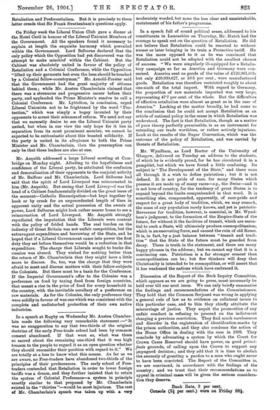In a speech full of sound political sense, addressed to
his constituents in Lancashire on Thursday, Mr. Hatch had the courage to speak out on the question of Retaliation. He did not believe that Retaliation could be resorted to without sooner or later bringing in its train a Protective tariff. He was the more opposed to it as he was convinced that Retaliation could not be adopted with the smallest chance of success. " We were singularly ill-equipped for a Retalia- tory campaign so far as America and Germany were con- cerned. America sent us goods of the value of E126,961,601, but only £20,930,627, or 16.5 per cent., were manufactured goods. Retaliation was therefore restricted roughly to about one-sixth of the total import. With regard to Germany, the proportion of raw materials imported was very large, representing 47.7 per cent. of the whole. But the difficulties of effective retaliation were almost as great as in the case of America." Looking at the matter broadly, he had come to the conclusion that he could not accept Retaliation as an article of national policy in the sense in which Retaliation was understood. The fact is that Retaliation, though as a matter of pure theory perfectly permissible, is as an instrument for extending our trade worthless, or rather actively injurious. Look at the results of the Sugar Convention, which was the outcome of the policy of Retaliation, and was carried by threats of Retaliation.














































 Previous page
Previous page